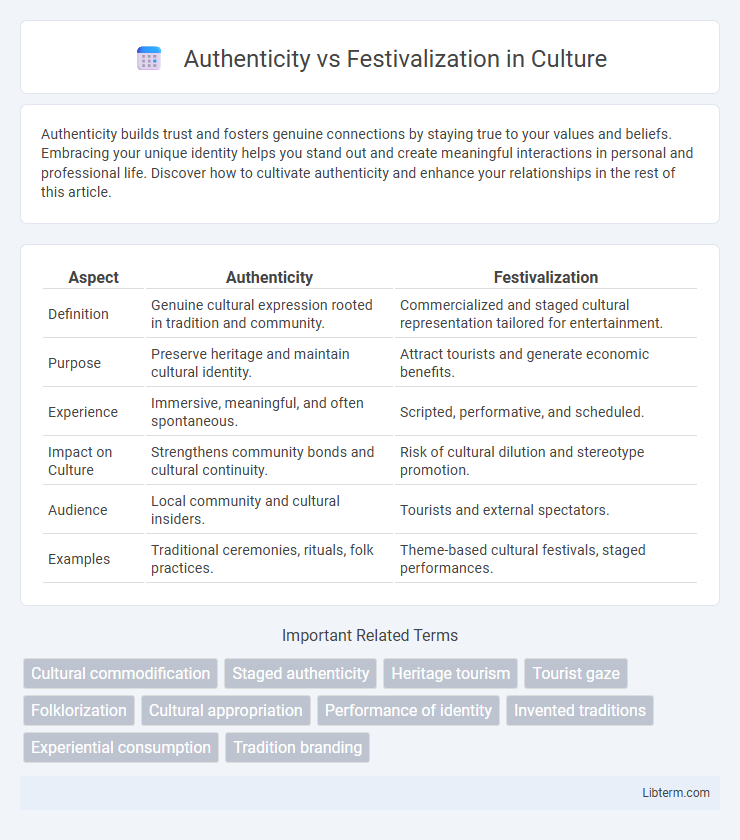Authenticity builds trust and fosters genuine connections by staying true to your values and beliefs. Embracing your unique identity helps you stand out and create meaningful interactions in personal and professional life. Discover how to cultivate authenticity and enhance your relationships in the rest of this article.
Table of Comparison
| Aspect | Authenticity | Festivalization |
|---|---|---|
| Definition | Genuine cultural expression rooted in tradition and community. | Commercialized and staged cultural representation tailored for entertainment. |
| Purpose | Preserve heritage and maintain cultural identity. | Attract tourists and generate economic benefits. |
| Experience | Immersive, meaningful, and often spontaneous. | Scripted, performative, and scheduled. |
| Impact on Culture | Strengthens community bonds and cultural continuity. | Risk of cultural dilution and stereotype promotion. |
| Audience | Local community and cultural insiders. | Tourists and external spectators. |
| Examples | Traditional ceremonies, rituals, folk practices. | Theme-based cultural festivals, staged performances. |
Understanding Authenticity in Cultural Events
Understanding authenticity in cultural events involves recognizing the genuine representation of traditions, practices, and values without commercialization or superficial alterations. Authenticity emphasizes preserving the cultural essence and heritage, while festivalization often entails adapting events for entertainment, tourism, and economic gain. Evaluating authenticity requires analyzing the roles of local communities, historical accuracy, and the impact of external influences on event narratives.
Defining Festivalization: Trends and Impacts
Festivalization refers to the process of transforming cultural events into large-scale, commercialized festivals that emphasize entertainment, branding, and economic growth. This trend drives increased tourism, local economic development, and urban regeneration but often risks oversimplifying or commercializing authentic cultural expressions. The impact of festivalization includes shifting the focus from traditional, community-centered practices to spectacle-driven experiences designed to attract wider audiences and sponsors.
The Historical Roots of Cultural Authenticity
Cultural authenticity originates from deeply rooted historical traditions and practices that define a community's identity over centuries. Festivalization often transforms these authentic elements into staged, commercialized events catering to tourism, which can dilute their original meanings and significance. Understanding the historical roots of cultural authenticity is essential to preserving genuine cultural expressions amidst growing globalization and commodification pressures.
Key Drivers Behind Festivalization
Festivalization is primarily driven by urban regeneration goals, cultural tourism promotion, and economic development strategies aimed at boosting local economies through increased visitor spending. Key drivers include the commercialization of cultural heritage, government policies supporting event-based city branding, and the desire to create inclusive public spaces that attract diverse audiences. These factors contribute to a shift from authentic cultural expressions toward market-oriented festival productions designed to maximize social and financial returns.
Authenticity vs Festivalization: Core Differences
Authenticity centers on preserving cultural integrity and genuine experiences rooted in local traditions, while festivalization emphasizes transforming cultural events into large-scale, often commercialized festivals designed for mass appeal and tourism. Authentic practices prioritize intrinsic cultural values and community involvement, whereas festivalization often adapts or exaggerates these elements to attract broader audiences and economic benefits. The core difference lies in authenticity's focus on cultural preservation versus festivalization's emphasis on spectacle and market-driven objectives.
Effects on Local Communities and Heritage
Authenticity in cultural heritage preserves the original traditions, practices, and identities of local communities, fostering a deep sense of pride and continuity. Festivalization, while boosting tourism and economic benefits, often commercializes and modifies cultural expressions, risking the dilution or loss of genuine heritage values. This tension impacts social cohesion and cultural sustainability, as communities may struggle to balance economic opportunities with the need to protect their authentic cultural legacies.
Economic Implications for Tourism
Authenticity in tourism emphasizes preserving cultural heritage and local traditions, which attracts niche markets willing to pay premium prices for genuine experiences, thus promoting sustainable economic growth. Festivalization, characterized by large-scale, commercially driven events, generates significant short-term revenue through mass tourism but may risk commodifying culture and causing economic leakage. Balancing authenticity with festivalization impacts local economies by influencing tourist spending patterns, community involvement, and long-term destination competitiveness.
Audience Perceptions and Expectations
Audience perceptions of authenticity in cultural events are shaped by expectations of genuine, traditional experiences that reflect the true heritage and values of a community. Festivalization often introduces commercialized, staged elements that may conflict with these expectations, leading to debates about the loss of cultural integrity. Balancing authenticity with the entertainment appeal of festivals requires careful curation to meet diverse audience desires while preserving meaningful cultural expressions.
Balancing Tradition and Commercialization
Balancing tradition and commercialization in the context of authenticity versus festivalization requires preserving cultural heritage while adapting to modern market demands without compromising core values. Authentic experiences rooted in local customs attract genuine interest, yet festivalization often introduces commercial elements that can dilute traditional significance for mass appeal. Sustainable management practices promote respect for cultural origins, ensuring festivals serve both economic goals and authentic community engagement.
Future Perspectives: Sustaining Authenticity in Festivals
Future perspectives on sustaining authenticity in festivals emphasize integrating community involvement and preserving cultural heritage while embracing innovative technology for immersive experiences. Strategies include promoting local artisans, traditional practices, and storytelling to maintain festival integrity amid growing commercialization. Leveraging digital platforms can enhance engagement without compromising the festival's core values or authenticity.
Authenticity Infographic

 libterm.com
libterm.com